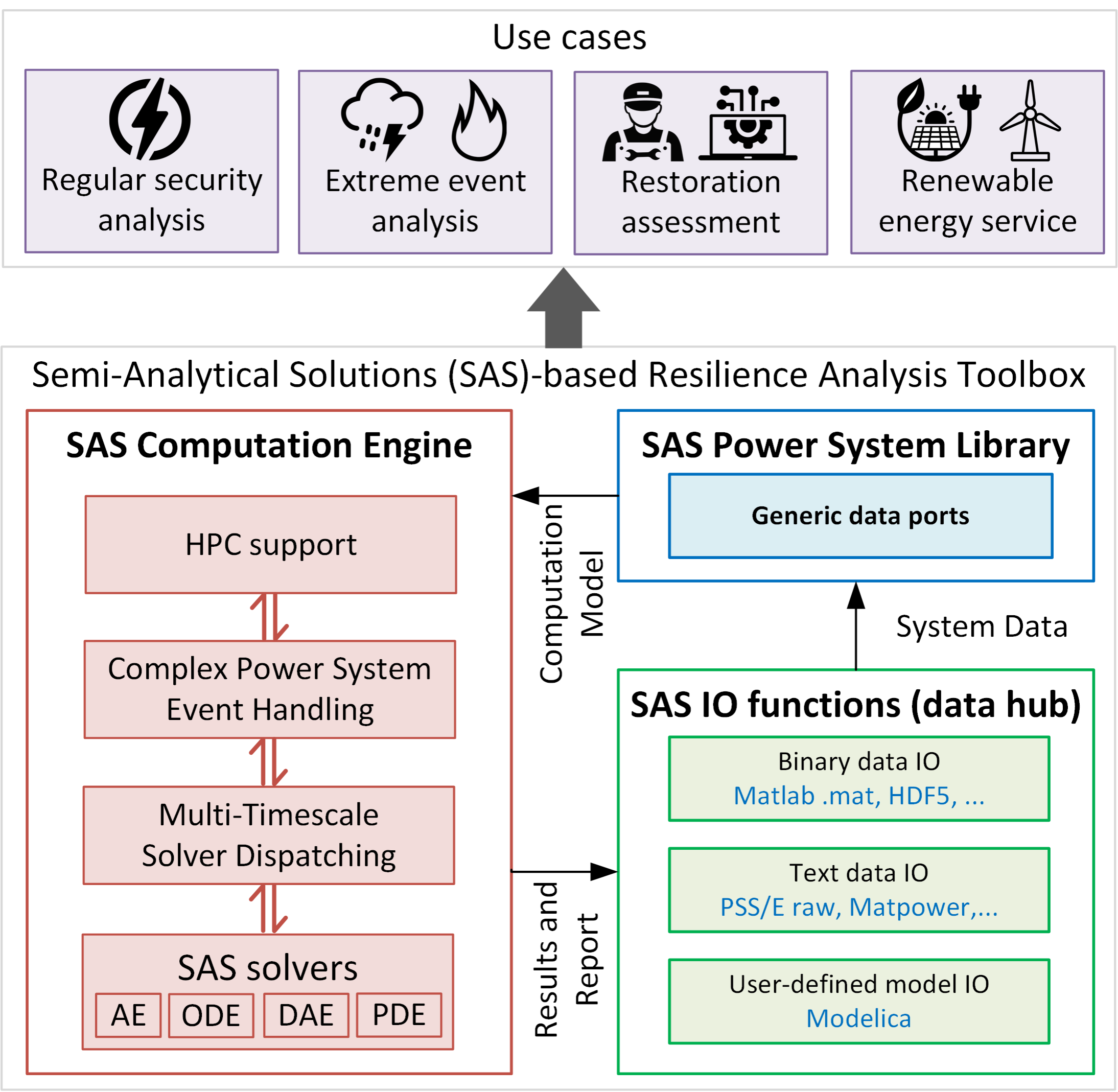Project Background
Power system operators primarily rely on two types of analysis, i.e., steady-state and dynamic security assessment, for assessing system resilience. Existing tools (commercial or open-source) work fine for routine security analysis under normal operating conditions. However, for resilience analysis which studies the system behavior under stressed states, complex events, broad regions and extended time, the existing approaches encounter several barriers that significantly hinders assessment of system resilience: (1) Numerical robustness. Resilience analysis often studies stressed systems, having ill-conditioned data and significant numerical issues. Traditional algorithms for solving nonlinear algebraic equations do not provide guarantee for convergence and thus often paralyze the grid analysis. (2) Scalability. The mainstream tools use numerical integration methods that struggle with the tradeoff between computational burden and numerical accuracy, which often leads to a large number of integration steps for the whole simulation process and thus limits the computational speed when higher accuracy is needed. (3) Lack of dedicated tools. Resilience analysis mainly focuses on extreme events, very different analysis than the traditional steady-state and dynamic security routines. Existing tools and software are not customized to this need, e.g., no existing tools can scale up for extended-term simulation, which is often needed for simulating resilience events such as cascading outages and restoration. There is an urgent need for dedicated computational approaches and tools for the stakeholders in the power grid industry to perform reliable and scalable resilience analyses for large-scale extreme events.
Scientific Opportunities
The goal of this research is twofold: (1) develop and enhance a set of novel simulation and optimization algorithms for power system security analysis to enable resilience study at a national level and (2) develop these algorithms into a professional-level software toolbox to disseminate the research results to power industry and research communities.
In this project, we will develop a grid resilience analysis toolbox based on a novel semi-analytical solution (SAS) approach. The SAS has desirable convergence guarantee and certificate resulting in more robust convergence performance in solving nonlinear network equations (e.g., AC power flows) than the trial-and-error procedure of gradient-search methods. When applying to dynamic simulations, SAS uses much larger time steps than the traditional numerical integration method, leading to significant scalability potential. SAS also provides desirable features as cross-timescale capability, modeling flexibility, accurate event-driven simulation as well as support for parallel computation and co-simulation. The SAS-based software toolbox will significantly strengthen the awareness and preparation capability of power grid stakeholders in routine grid analysis as well as facing the challenges of extreme events and increasingly variant system states.
Research Goal
In this project, we will first develop the theory of semi-analytical solution (SAS) approach, as the theoretical and methodological basis of the resilience analysis toolbox. The SAS approach will bring in more robust convergence profile and significantly enhanced performance as compared with traditional approaches. We also propose computational approaches that enable high-performance computation in SAS, which includes multiple level of robust parallel and distributed computation algorithms to enhance the performance of SAS-based analysis. Finally, we will build an open-source dedicated toolbox based on SAS for resilience analysis. A library of power system models in SAS formulation will be established and APIs of security assessment routines (e.g., power flow, continuation power flow, contingency analysis, dynamic simulation, and user-defined analysis) will be provided.
We will develop several use cases using the SAS-based toolbox, including extreme event analysis (e.g. cascading outages), restoration simulation and assessment, evaluation of renewable energy providing grid services, etc.
Research Plan
On the development of theoretical method, we will perform investigation and enhancement of algorithms and computational methods for SAS to develop static and dynamic security analysis for resilience analysis at a national level. We will develop a library of mathematical models of SAS based on holomorphic embedding (HE) for all possible routines and events in security analysis. These formulations act as elements that can be “assembled” into more complex events in a power system and thus establish the theoretical basis of this project.
On the development of software toolbox, the modeling/simulation framework aims to help researchers and engineers quickly build their resilience analysis application using our modeling framework. A computational architecture, including a set of libraries, will be developed.
Deliverables and Impacts
Deliverable List:
An open-source toolbox for national-scale grid resilience analysis with model libraries.
Technical reports on the developed computational approaches for the toolbox and implementation details.
Use case technical reports and demonstration.
Publications in peer-reviewed journals and conferences.
Tutorials and webinars on core methodology, key features and software usages.
Publications List:
Rui Yao, Feng Qiu, Kai Sun, “Contingency Analysis Based on Partitioned and Parallel Holomorphic Embedding”, IEEE Transactions on Power Systems, in press.
Xin Xu, Rui Yao*, Kai Sun, Feng Qiu, “A Semi-Analytical Solution Approach for Solving Constant-Coefficient First-Order Partial Differential Equations”, IEEE Control Systems Letters.
Rui Yao, Feng Qiu, “Novel AC Distribution Factor for Efficient Outage Analysis”, IEEE Transactions on Power Systems, 35 (6), 4960-4963, 2020. Bai Cui, Rui Yao, Feng Qiu, “Certification and prediction of post-disturbance states in dynamic security assessment”, Electric Power Systems Research, 189, 106751, 2020.
Rui Yao, Yang Liu, Kai Sun, Feng Qiu, Jianhui Wang, “Efficient and Robust Dynamic Simulation of Power Systems with Holomorphic Embedding”, IEEE Transactions on Power Systems, 35 (2), 938 - 949, 2020.
Rui Yao, Kai Sun, et al., “Voltage Stability Analysis of Power Systems with Induction Motors Based on Holomorphic Embedding”. IEEE Transactions on Power Systems, 34 (2), 1278-1288, 2019.
Team and contact
Argonne National Laboratory (Lead)
University of Tennessee
George Mason University
Advisory: North American Electric Reliability Corporation (NERC)
Lab Lead Team Members
Dr. Feng Qiu
Dr. Yichen Zhang
Mr. Xin Xu (Intern)
Project PI: Dr. Rui Yao
Energy Systems Scientist
Energy Systems and Infrastructure Analysis
ryao@anl.gov
